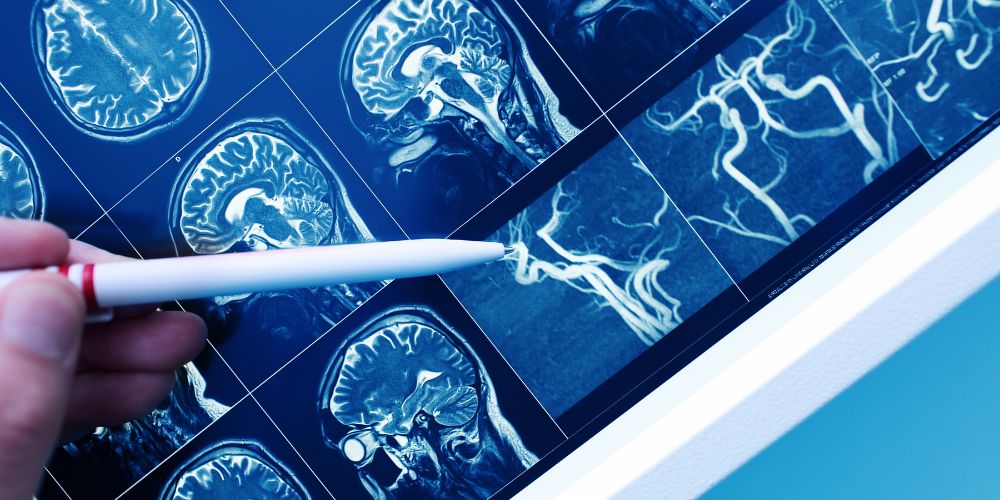Recently updated on January 21st, 2026 at 10:27 am
Vascular dementia is a complex neurological condition that arises from impaired blood flow to the brain, causing cognitive decline. It differs significantly from common dementia, such as Alzheimer’s disease, which involves the gradual deterioration of brain cells and their connections. To fully grasp the intricacies, it’s crucial to delve into vascular dementia stages, causes, symptoms, progression, and how to support those facing this challenging condition.
Understanding Vascular Dementia

Vascular dementia is a condition characterized by cognitive impairment due to insufficient blood flow to the brain. Unlike common dementia and it’s types, where brain cells deteriorate, vascular dementia’s root cause is damage to the brain’s blood vessels. This fundamental difference underscores the need to view vascular dementia as a distinct entity within the broader spectrum of dementia-related disorders.
Distinguishing Vascular Dementia from Common Dementia and Its Types
Distinguishing vascular dementia from common forms of dementia is essential for proper diagnosis and treatment. While common dementia, such as Alzheimer’s, involves a gradual decline in brain cells, vascular dementia results from reduced blood flow to specific brain regions. This distinction emphasizes the importance of tailored approaches to diagnosis and care.
| Factor | Common Dementia | Vascular Dementia |
|---|---|---|
| Root Cause | Deterioration of brain cells | Damage to blood vessels |
| Typical Symptoms | Gradual memory loss | Sudden cognitive changes |
| Diagnosis | Biomarker tests, imaging | Imaging, clinical criteria |
Types of Vascular Dementia
Vascular dementia can manifest in various forms, each with its unique characteristics:
- Multi-Infarct Dementia (MID): MID results from small strokes that damage different brain areas. These strokes can occur over time, leading to a cumulative decline in cognitive function.
- Subcortical Vascular Dementia: This form primarily affects subcortical brain regions, causing issues with mood regulation, motivation, and walking. It often presents with changes in gait and depressive symptoms.
- Strategic Infarct Dementia: This type often leads to memory deficits and problems with executive functions, such as planning and decision-making, due to damage in specific brain areas. It may result from a single significant stroke or multiple smaller ones.
The 7 Stages of Vascular Dementia

Understanding the progression of vascular dementia is vital for both patients and caregivers. The condition typically unfolds in seven stages:
- No Impairment: There are no apparent signs of cognitive decline at this stage, and individuals can function normally.
- Minimal Cognitive Decline: Individuals may experience mild memory lapses, often attributed to aging. These lapses don’t significantly impact daily life.
- Mild Cognitive Impairment: Cognitive deficits become noticeable, affecting daily tasks and memory. Individuals may have trouble finding words, following conversations, or remembering recent events.
- Mild Dementia: Symptoms become more pronounced, leading to difficulties with problem-solving, decision-making, and communication. Memory loss becomes more evident.
- Moderate Dementia: Individuals require substantial assistance with daily activities at this stage. They may struggle with basic tasks like dressing and feeding themselves.
- Moderately Severe Dementia: Cognitive function continues to decline, and individuals may lose the ability to recognize loved ones. Communication becomes increasingly challenging, often reduced to non-verbal cues.
- Severe Dementia: Patients depend entirely on others for their care in the final stage. Communication is severely impaired, and individuals may be bedridden. Providing comfort and maintaining quality of life become the primary goals of care.
Vascular Dementia Causes And Symptoms:
Causes of Vascular Dementia
Vascular dementia primarily results from conditions that affect blood vessels in the brain. These include:
- Stroke: A major contributor, as both ischemic and hemorrhagic strokes can damage brain tissue.
- Atherosclerosis: The buildup of fatty deposits in blood vessels, reducing blood flow to the brain.
- High Blood Pressure: Long-term hypertension can damage blood vessels, increasing the risk of vascular dementia.
- Diabetes: Uncontrolled diabetes can harm blood vessels and increase the likelihood of cognitive impairment.
- Small Vessel Disease: This condition involves damage to the tiny blood vessels in the brain, often seen in vascular dementia cases.
Common Symptoms of Vascular Dementia
Symptoms of vascular dementia can vary widely, but common manifestations include:
- Memory Loss: Initially, individuals may experience difficulty recalling recent events and conversations.
- Confusion: Frequent episodes of disorientation and confusion.
- Difficulty Concentrating: Struggling to focus or make decisions.
- Mood Swings: Fluctuations in mood, often including irritability or depression.
- Walking and Balance Issues: Unsteady gait, increasing the risk of falls.
- Incontinence: Loss of bladder or bowel control, particularly in later stages.
Vascular Dementia Progression

The rate of progression of vascular dementia varies from person to person and is influenced by factors such as overall health, treatment, and the condition’s underlying cause. In some cases, the disease may progress slowly over several years, while in others, it may advance more rapidly. Understanding how does dementia progress among individuals is essential for tailoring care and support. Vascular dementia causes and symptoms vary from patient to patient.
Early-Stage Vascular Dementia
During the early stage, individuals may experience mild memory lapses and difficulties with concentration. They might forget recent conversations, appointments, or the location of everyday items. maintaining a healthy lifestyle, managing underlying health conditions, seeking medical advice, and utilizing medication management tools like automated dispensers and pharmacogenomics can help reduce errors, side effects, and slow disease progression.
Middle-Stage Vascular Dementia
As vascular dementia advances, individuals may require increasing assistance with daily activities. Memory loss becomes more evident, and mood swings can be challenging to manage. Caregiver support and structured routines are essential during this stage to ensure the safety and well-being of the individual.
Late-Stage Vascular Dementia
In the late stage of vascular dementia, individuals may lose the ability to communicate effectively and perform basic tasks independently. Round-the-clock care is often necessary, and maintaining the individual’s comfort and quality of life becomes the primary goal. Providing compassionate and specialized senior care is crucial during this challenging phase.
Vascular Dementia Risk Factors, Prevention, and Treatments:
 Risk Factors for Vascular Dementia
Risk Factors for Vascular Dementia
Vascular dementia is often associated with specific risk factors that can increase the likelihood of its development. Recognizing these risk factors is crucial for early intervention and risk reduction. Here are some key risk factors:
- Age: Advanced age is a significant risk factor for vascular dementia. While it can occur in younger individuals, the risk increases with each passing year.
- Hypertension (High Blood Pressure): Uncontrolled high blood pressure can damage blood vessels in the brain over time, increasing the risk of vascular dementia.
- Atherosclerosis: The buildup of fatty deposits in blood vessels can lead to reduced blood flow to the brain, potentially contributing to vascular dementia.
- Diabetes: Individuals with diabetes are at a higher risk of developing vascular dementia. High blood sugar levels can damage blood vessels and contribute to cognitive decline.
- Smoking: Smoking is a well-established risk factor for vascular dementia. It can contribute to the narrowing of blood vessels and increase the likelihood of stroke, a significant factor in the development of vascular dementia.
- High Cholesterol: Elevated cholesterol levels in the blood can lead to atherosclerosis, which, in turn, can contribute to vascular dementia.
- Heart Disease: Conditions like atrial fibrillation (an irregular heart rhythm) and heart disease can increase the risk of blood clots, which may lead to strokes and vascular dementia.
- Obesity: Obesity is associated with several risk factors for vascular dementia, including high blood pressure and diabetes.
- Family History: A family history of dementia, especially vascular dementia, may increase an individual’s susceptibility to the condition.
- Ethnicity: Some ethnic groups may have a higher risk of vascular dementia, although the reasons for these disparities are not fully understood.
Preventing Vascular Dementia
While it may not always be possible to prevent vascular dementia entirely, several strategies can help reduce the risk and delay its onset:
- Manage Blood Pressure: If necessary, regular monitoring and management of blood pressure through lifestyle changes and medications can help reduce the risk of vascular dementia.
- Control Diabetes: For individuals with diabetes, keeping blood sugar levels within a target range is crucial to prevent vascular complications.
- Quit Smoking: Smoking cessation is one of the most effective ways to reduce the risk of vascular dementia. It can lead to significant improvements in vascular health.
- Maintain a Healthy Diet: A diet rich in fruits, vegetables, whole grains, and lean proteins can support cardiovascular health and reduce the risk of atherosclerosis.
- Exercise Regularly: Physical activity is essential for maintaining healthy blood vessels and reducing the risk of vascular dementia. Aim for at least 150 minutes of moderate-intensity exercise per week.
- Manage Cholesterol Levels: Working with a healthcare provider to manage cholesterol levels through diet, exercise, and medication, if necessary, can help prevent atherosclerosis.
- Control Weight: Maintaining a healthy weight through a balanced diet and regular exercise can reduce the risk of obesity-related risk factors for vascular dementia.
- Limit Alcohol Consumption: Excessive alcohol consumption can contribute to high blood pressure and other cardiovascular problems. Moderation is key to reducing this risk.
- Stay Mentally and Socially Active: Engaging in intellectually stimulating activities and maintaining a robust social network can support cognitive health.
- Manage Stress: Chronic stress can contribute to high blood pressure and other vascular risk factors. Stress-reduction techniques such as meditation, yoga, and deep breathing exercises can be beneficial.
Treatments for Vascular Dementia
While there is no cure for vascular dementia, several treatments and interventions can help manage symptoms and improve the quality of life for individuals affected by the condition. Treatment plans are typically tailored to the individual’s specific needs and may include:
- Medications: Some medications can help manage the symptoms of vascular dementia. These may include drugs to control high blood pressure, manage diabetes, or address mood and behavioral symptoms.
- Cognitive Rehabilitation Therapy: Cognitive rehabilitation programs are now increasingly personalized and supported by digital tools, showing moderate efficacy in slowing cognitive decline, especially when technology-enhanced and integrated into daily routines.
- Physical Therapy: Physical therapy, particularly when augmented with AI and wearable-assisted programs, can improve balance by up to 49% and significantly reduce fall risk and hospitalizations in vascular dementia patients.
- Occupational Therapy: Occupational therapy now frequently incorporates smart home integration and structured digital routines, enhancing daily living adaptation and stability, especially for dementia patients.
- Speech Therapy: Speech therapy is increasingly delivered via digital and telehealth platforms, making language therapy more accessible and supporting communication in dementia and post-stroke patients.
- Supportive Care: As the disease progresses, individuals with vascular dementia may require increasing levels of care and assistance with daily activities. Caregivers and healthcare providers play a critical role in providing this support.
- Lifestyle Modifications: Encouraging a healthy lifestyle focusing on diet, exercise, and stress management is essential in managing vascular dementia.
- Clinical Trials: Some individuals may participate in clinical trials investigating potential treatments and interventions for vascular dementia. These trials aim to advance our understanding of the condition and develop new therapies.
In recent years, technological innovations have revolutionized vascular dementia care. Smart home devices like voice-activated assistants, automated thermostats, and wearable health monitors enhance safety and independence by managing daily routines and vital signs. AI-powered fall detection systems have been shown to reduce fall rates by over 50%, while telemedicine enables accessible follow-ups and specialist consultations from home. Digital tools such as memory care apps, virtual reality experiences, and personalized cognitive rehabilitation therapy are also being used to engage patients and slow cognitive decline, supported by holistic and data-driven care models.
Supporting a Loved One Experiencing Dementia Symptoms

Supporting a loved one with vascular dementia can be emotionally and physically demanding. Caregivers should seek education and support on navigating digital health tools and telehealth platforms to provide the best possible Alzheimer and dementia care, improving continuity and response to emerging needs. Maintaining open communication, preserving dignity, and creating a safe and structured environment are crucial for the patient and their caregivers.
Additionally, caregivers can leverage digital tools to create structured routines with reminders and monitoring, which help reduce anxiety and improve stability for dementia patients. Emerging approaches like pharmacogenomics allow for personalized medication plans based on genetic profiles, minimizing side effects and optimizing management of complex conditions.
Conclusion
Vascular dementia is a challenging condition that affects millions of people worldwide. A comprehensive understanding of its stages, causes, symptoms, progression, and caregiving strategies is vital for patients, caregivers, and healthcare professionals.
Loving Homecare offers impeccable dementia care services for your loved ones. They can live improved lives and cope with symptoms better with learned professional guidance.
With proper care, early intervention, and a supportive network, individuals with vascular dementia can maintain their quality of life and dignity throughout their journey with this condition.



 Risk Factors for Vascular Dementia
Risk Factors for Vascular Dementia